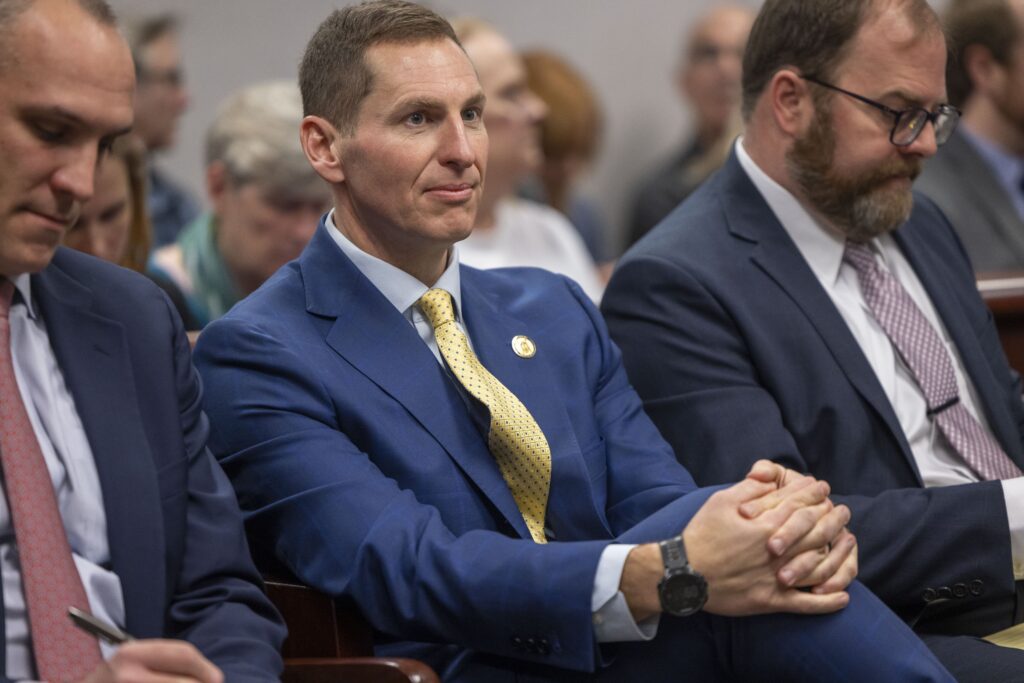
The North Carolina Court of Appeals heard oral argument Friday in Republican state Supreme Court candidate Jefferson Griffin’s ongoing legal effort to overturn the results of last year’s election and disenfranchise some 65,000 voters.
In November, Griffin, an appeals court judge, lost the contentious state Supreme Court race to incumbent Justice Allison Riggs (D) by 734 votes. But even after two recounts, Griffin refused to concede, instead mounting a massive legal challenge against the North Carolina State Board of Election’s (NCSBE) decision to count 65,000 ballots from voters that he claims were ineligible to cast ballots, because of registration errors.
On Friday, lawyers for Griffin laid out their case for retroactively disqualifying 65,000 ballots, disenfranchising tens of thousands of registered voters and overturning the election results and Riggs’s victory. At the heart of the issue is ballots cast by voters with allegedly incomplete registrations — a majority of whom were overseas and military voters who were told they did not need to provide photo ID to vote. Griffin’s lawyers argue that they did, in fact, need to provide a photo ID and because the NCSBE didn’t adequately address the problem and decided to count their ballots, they should be retroactively disqualified.
Griffin’s lawyer, Craig Schauer, argued that allowing such ballots cast by voters who did not provide photo ID opens up the state to the possibility of voter fraud.
“Now the right to vote is not absolute,” he said. “The North Carolina Supreme Court and the U.S. Supreme Court made clear that the right to vote is subject to the state’s need to protect the integrity of the elections.”
But Nicholas Brod, an attorney for the NCSBE, said voters should not be punished for a mistake made by the state board. “From the voters’ perspective, they did everything that they were asked to do in order to cast a ballot,” he said, and added there’s “a mountain of state Supreme Court precedent that says over and over again that it would be fundamentally unfair to punish voters for errors that election officials make.”
Raymond Bennett, the attorney representing Riggs, also argued that there’s a deep history of legal precedent to justify not overturning the election. “For more than 200 years, elections have proceeded in this country under a principle so basic that it is known on every elementary school playground: You cannot change the rules after the game has been played,” he said. “If you lose, you accept defeat graciously.”
The case was heard by a GOP majority three-judge Court of Appeals panel, who didn’t give any clear indications about how they may rule on this case. Prior to the hearing, a bipartisan coalition of more than 200 North Carolina jurists, attorneys, state government officials, bar leaders and legal educators signed on to a letter to Griffin urging him to end his lawsuit and accept defeat in the election.
Griffin’s challenge has taken a number of twists and turns, delaying certification of the election for more than four months, until the matter is resolved in state court. The NCSBE filed motions to move both of Griffin’s challenges to the elections to federal court, but the 4th U.S. Circuit Court of Appeals ruled last month that the cases should play out in state court — but added that the matter could return to federal court if there are outstanding federal legal issues.
Griffin’s lawsuit isn’t the sole GOP effort to overturn the election. A concurrent lawsuit filed by the Republican National Committee is also seeking to have a court toss out tens of thousands of ballots cast in the November election for the same reasons raised by Griffin. In January, the North Carolina Court of Appeals stayed proceedings in the case while it considered Griffin’s lawsuit; the lawsuit is also pending in the 4th Circuit.
At the end of the hearing, Riggs’s lawyer Bennett laid out his closing argument that summarized what’s at stake in this case.
“It’s time for this election to come to an end and for voters to know that their votes will count in the state, that they follow the rules in place at the time of the election,” Bennett said. “The state courts have the ability to provide that certainty and to strengthen the integrity of our elections by rejecting Judge Griffin’s protest on the merits under state law.”
